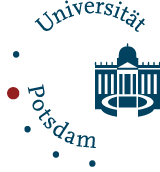Research data in the humanities? An expert discussion with Prof. Dr. Laurent Romary (INRIA, DARIAH-EU) and Dr. Ulrike Wuttke (FH Potsdam)
Thursday 24th October, 2pm – 4.30pm, Campus Neues Palais House 11 Room 2.19
The digital transformation is changing the infrastructures of universities and research facilities across the disciplinary spectrum. In recent years, also the research and teaching practices of the humanities have begun to utilize the potentials offered by digital tools and methods. The variety of possibilities in digital publication, research and analysis has culturally changed humanistic work to a degree that has not been discussed properly up to this point. Whilst the field of natural sciences has made use of digital methods to produce, maintain, use, share and manage research data for some time now, the humanities have focused very little on the topic of ‘research data’.
However, larger national and supra-national infrastructure projects such as “Nationale Forschungsdaten Infrastruktur” (NFDI or National Research Data Infrastructure) or “European Open Science Cloud” (EOSC) may serve as examples for the cultural change of academic work across the disciplines. However, these processes also bring up many questions. The network Digital Humanities invites all those interested to an expert talk to discuss current developments and other questions:
- How do the epistemological conditions of humanistic work change with greater digital accessibility of primary and secondary sources?
- What is humanistic research data? How do we deal with it?
- Using research data in the natural and engineering sciences has been a common practice for some time. Which assessment criteria and circuit methods need to be established in the humanities to use the full potential of digital research data?
- Is the field of Digital Humanities a direct result of this transformation of the humanities?
- Which infrastructures are needed to manage, save and curate the humanities‘ research data?
- Will the relevance of research data change for the humanities? What can we learn from the natural sciences?
- How does digital transformation change assessment criteria in sciences, specifically that of the humanities?
- What is the current political opinion regarding these changes?
- What is NFDI /EOSC? How do these initiatives change our assessment criteria?
Please sign up here: digital-humanities@uni-potsdam.de

